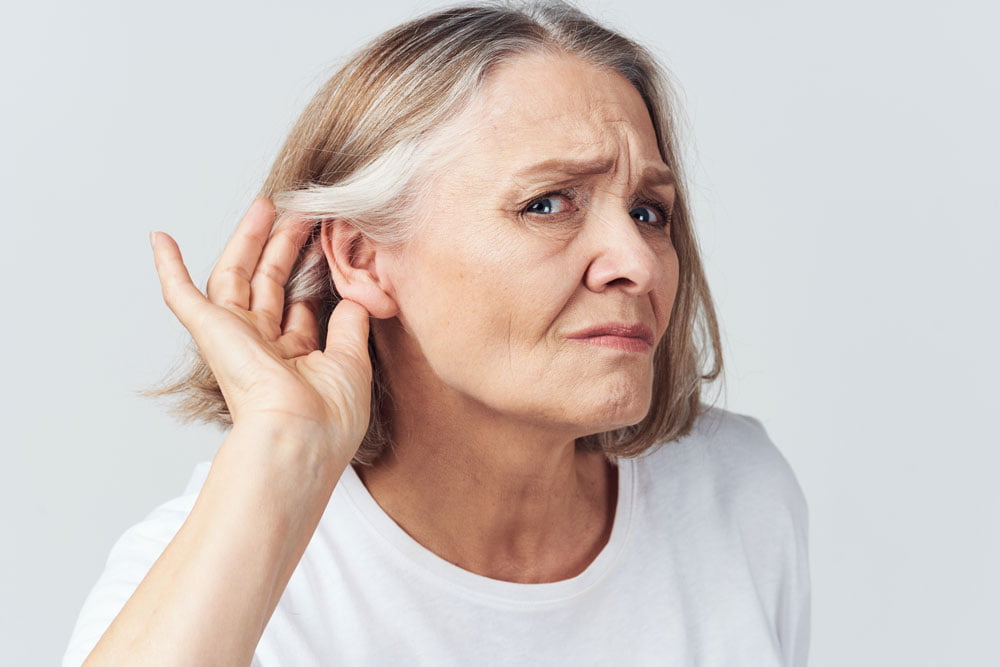Many people experience hearing loss. However, not all types of hearing loss are the same. One less well-known but equally important type of hearing loss is low-frequency hearing loss. In this blog post, we’ll explore the causes, symptoms, and solutions for this condition to support those who live with it.
What is Low-Frequency Hearing Loss?
Experts often refer to low-frequency hearing loss as ‘bass tone hearing loss.’ It’s a type of hearing impairment that primarily affects an individual’s ability to hear sounds in the lower frequencies of the audible spectrum. You’ll find these lower frequencies in deep bass guitar tones, rumbling thunderstorms, or low hum of car engine. When someone experiences low-frequency hearing loss, they may hear these sounds as muffled, distorted, or even miss them entirely.
What Causes Low-Frequency Hearing Loss?
Several factors can contribute to the development of low-frequency hearing loss:
- Aging: Just like high-frequency hearing loss, age-related hearing loss (presbycusis) can also impact low-frequency hearing. As people age, their ability to hear lower-pitched sounds tends to diminish.
- Noise Exposure: Exposure to loud noise, whether from occupational settings, recreational activities, or personal audio devices, can damage the hair cells in the inner ear responsible for low-frequency sound perception.
- Medical Conditions: Certain medical conditions, such as Meniere’s disease or otosclerosis, can affect hearing in low-frequency.
- Genetics: Some individuals may be genetically predisposed to low-frequency hearing loss, which means it can run in families.

What Are the Symptoms?
Identifying the symptoms of low-frequency hearing loss can be crucial for early diagnosis and treatment. Some common signs to watch out for include:
- Difficulty Hearing Deep Voices: People with this hearing loss may struggle to hear the voices of individuals with deeper tones, making it challenging to engage in conversations with them.
- Inability to Detect Low-Pitched Sounds: You might not notice sounds like footsteps, distant thunder or the bass in music-or miss them entirely.
- Muffled or Distorted Sound Perception: Low-frequency sounds may come across as muffled or distorted, making it hard to understand spoken words or enjoy music and other audio experiences.
- Increased Volume for Clarity: Individuals with hearing loss in low-frequency may find themselves constantly increasing the volume on their TVs, radios, or other audio devices to compensate for their impaired hearing.
How Is the Condition Diagnosed?
Diagnosing low-frequency hearing loss can indeed be challenging due to its relative rarity and the subtleness of its symptoms. Often, individuals may not even be aware that they have this type of hearing loss until it significantly affects their daily life. Audiologist also call this unique type ‘reverse-slope hearing loss’ because the audiogram shows an upside-down slope pattern. In a typical audiogram, higher-frequency sounds are represented on the left, and lower-frequency sounds on the right. With reverse-slope hearing loss, people often struggle to hear low-pitched sounds because their hearing thresholds are significantly elevated in that range.
To address this issue, individuals should regularly visit a qualified audiologist for hearing evaluations. Audiologists conduct comprehensive tests, including audiometry and specialised low-frequency assessments, to accurately diagnose and assess the extent of the condition. When diagnosing the condition early helps ensure timely intervention and better overall management of this hearing loss, ensuring that individuals can enjoy a fuller and more vibrant auditory experience.

Solutions for Low-Frequency Hearing Loss
The good news is that there are solutions available to help individuals with low-frequency hearing loss. These include:
- Hearing Aids: Hearing aids can be programmed to amplify low-frequency sounds, improving the wearer’s ability to hear and understand speech and enjoy various sounds.
- Cochlear Implants: In severe cases of low-frequency hearing loss, cochlear implants can provide a more advanced solution by directly stimulating the auditory nerve.
- Assistive Listening Devices: These devices, such as FM systems or loop systems, can be used in specific environments to enhance sound quality and reduce background noise.
- Lifestyle Changes: Avoiding excessive noise exposure, using hearing protection in noisy environments, and managing underlying medical conditions can also help prevent or manage low-frequency hearing loss.
Conclusion
Low-frequency hearing loss is a less well-known but important aspect of hearing difficulty. Understanding its causes, recognising its symptoms, and exploring available solutions can make a significant difference in the lives of those affected by this condition. If you or someone you know is experiencing symptoms for these, seeking help from a hearing care provider like Hear4U is the first step toward better hearing and an improved quality of life. Don’t let hearing loss limit your connection to the world of sound; take action today by booking a free hearing test with us!






